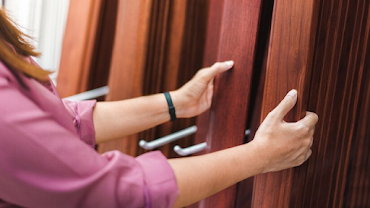The best materials for louvered doors: An in-depth comparison
Louvered doors are a popular choice for homes and businesses because they offer both privacy and ventilation. These doors are typically made from a variety of materials, each with its own unique properties and advantages. In this blog, we will provide an in-depth comparison of the best materials for louvered doors.
- Wood
Wood is a popular material for louvered doors because it is sturdy and can be stained or painted to match the surrounding decor. It is also a natural insulator, which means it can help keep a room warm in the winter and cool in the summer.
One of the downsides of wood is that it can be susceptible to moisture damage. If the door is exposed to a lot of moisture, it can warp, crack, or rot. To prevent this from happening, it is important to choose a high-quality wood that is properly sealed or finished.
- Vinyl
Vinyl is a popular material for louvered doors because it is affordable, lightweight, and easy to maintain. It is also resistant to moisture, which makes it a good choice for areas like bathrooms, kitchens, and laundry rooms.
One of the downsides of vinyl is that it is not as strong as other materials like wood or metal. It can also become brittle over time, especially if it is exposed to sunlight or extreme temperatures.
- Aluminum
Aluminum is a popular material for louvered doors because it is strong, lightweight, and resistant to rust and corrosion. It is also easy to maintain and can be painted or powder-coated to match the surrounding decor.
One of the downsides of aluminum is that it is not as strong as other metals like steel. It can also be prone to dents and scratches if it is not properly protected.
- Steel
Steel is a popular material for louvered doors because it is strong, durable, and resistant to impact and corrosion. It is also easy to maintain and can be painted or powder-coated to match the surrounding decor.
One of the downsides of steel is that it is heavy, which can make it difficult to install or move. It can also be prone to rust and corrosion if it is not properly protected.
FAQ:
- Q: Can louvered doors be used for outdoor applications?
A: Yes, louvered doors can be used for outdoor applications. However, it is important to choose a material that is resistant to rust, corrosion, and other types of weather damage. Aluminum and steel are two materials that are commonly used for outdoor louvered doors.
- Q: What is the best material for louvered doors?
A: The best material for louvered doors depends on the specific application and requirements. Wood is a good choice for indoor applications where a traditional look is desired. Vinyl is a good choice for areas that are prone to moisture or humidity. Aluminum and steel are good choices for outdoor applications or areas where a higher level of durability is required.
- Q: How do I maintain my louvered doors?
A: The maintenance requirements for louvered doors will depend on the material. Wood doors should be cleaned and resealed or refinished periodically. Vinyl doors can be cleaned with a mild detergent and water. Aluminum and steel doors should be cleaned with a mild detergent and water and can be repainted or powder-coated as needed.
Conclusion:
Louvered doors are a versatile and practical choice for homes and businesses. When choosing a material for your louvered doors, consider factors like durability, maintenance requirements, and the specific application. Wood, vinyl, aluminum, and steel are all popular choices, each with its own unique advantages and disadvantages. With the right material and proper maintenance, your louvered doors can provide years of reliable service.




Comments
Post a Comment